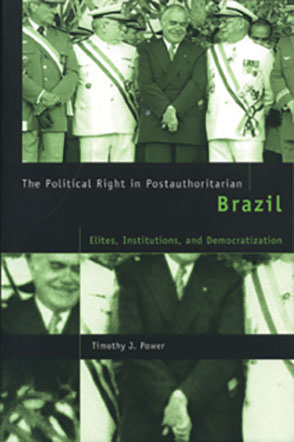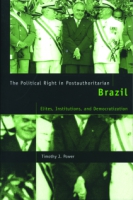
The Political Right in Postauthoritarian Brazil
Elites, Institutions, and Democratization
Timothy J. Power
The Political Right in Postauthoritarian Brazil
Elites, Institutions, and Democratization
Timothy J. Power
“This book makes a significant, original contribution to Brazilian political studies in the post-authoritarian period as well as to the extensive case-study and comparative literature on democratic transitions and consolidations. It weaves together in sophisticated, carefully nuanced, and persuasive fashion a large body of literature in English and Portuguese bearing on elites, parties, electoral systems, and representative institutions. Power succeeds in shedding new light on the behavior of professional politicians affiliated with pro-authoritarian parties as they adapt to the more open and competitive political environment. I expect Power’s book will become an obligatory reference for future work in Brazil and elsewhere on political elites and representative institutions. It should rapidly become a standard item on the bookshelf of all Brazilianists who study contemporary Brazilian politics and history.”
- Description
- Reviews
- Bio
- Subjects
In this book Power examines this cohort of civilian politicians, showing how they adapted to competitive politics after the 1985 regime transition and how their socialization to politics in the 1960s and 1970s shaped their initially negative attitudes toward institution building in the 1980s and 1990s—with deleterious consequences for Brazil’s fledgling democracy. Power’s study sheds new light on the paradoxes, tradeoffs, and drawbacks of conservative transitions to democracy.
“This book makes a significant, original contribution to Brazilian political studies in the post-authoritarian period as well as to the extensive case-study and comparative literature on democratic transitions and consolidations. It weaves together in sophisticated, carefully nuanced, and persuasive fashion a large body of literature in English and Portuguese bearing on elites, parties, electoral systems, and representative institutions. Power succeeds in shedding new light on the behavior of professional politicians affiliated with pro-authoritarian parties as they adapt to the more open and competitive political environment. I expect Power’s book will become an obligatory reference for future work in Brazil and elsewhere on political elites and representative institutions. It should rapidly become a standard item on the bookshelf of all Brazilianists who study contemporary Brazilian politics and history.”
“Power’s research is careful and well designed. His analysis is intelligent and nuanced. His results are persuasive. The book is well written. This work is a subtle and effective analysis of a key political actor-dominant in Brazil under dictatorship, powerful still under constitutional government, and theoretically significant for understanding the prospects for democratic consolidation in a great many countries.”
“If the purpose of this study was ‘to generate concepts and hypothesis that can be employed in cross-national analysis of conservative transitions to democracy’ (p. 5), both comparativists in general and Latin Americanists in particular will find here an originally operationalized and clearly explained research strategy on democratic consolidation.”
“Power’s book is a must for those who want to understand the role played by the Right in Brazil during the 1980s and the 1990s.”
“Power’s evidence suggests that the right cannot be ignored, but it also shows that the right can be bargained with and that it may be evolving in ways that favor political reform. The Political Right in Postauthoritarian Brazil represents one of the best efforts in recent years to understand this core agent in Brazilian politics. The book is an astute complement to Frances Hagopian’s excellent study of traditional politics (Traditional Politics and Regime Change in Brazil) that should rest on the shelf of all Brazilianists, alongside the best work on Brazilian politics.”
“But Power has given us an illuminating study on how the Brazilian right obstructed, distorted and undermined the democratic state for which millions of Brazilians had worked and prayed.”
“Timothy Power’s book, The Political Right in Postauthoritarian Brazil, is an excellent addition to the body of literature that examines the transition from authoritarian rule to Brazil’s New Republic.”
Timothy J. Power is Assistant Professor of Political Science at Florida International University.
Mailing List
Subscribe to our mailing list and be notified about new titles, journals and catalogs.



